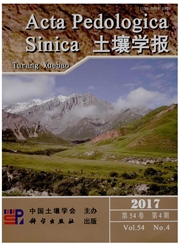

 中文摘要:
中文摘要:
根据NO3-、Cl-和SO4^2-对可变电荷土壤和恒电荷土壤吸附Cu^2+的影响的比较,探讨了阴离子对可变电荷土壤吸附Cu^2+的影响机理。结果表明,当3种阴离子的浓度相同时,在SO4^2-体系中铁质砖红壤对Cu^2+的吸附率较在NO3-和Cl一体系中大得多,而在浓度相同的3种阴离子体系中,黄棕壤对Cu^2+的吸附率相差不大。在离子强度相近的NaCl体系中,砖红壤对Cu^2+的吸附率相近。在3种阴离子体系中,随着pH升高,砖红壤对Cu^2+的吸附率均增大;但在NO3-体系和Cl-体系中Cu^2+的吸附率相近;而在SO4^2-一体系中Cu^2+的吸附率最大。随着Na2SO4浓度的增大,铁质砖红壤和砖红壤对Cu^2+的吸附率减小。但在0.005molL^-1和0.05molL11Na2sO4体系中,Cu^2+的吸附率大于在不含Na2sO4的体系中者。而在0.5molL~Na2SO4体系中,Cu^2+吸附率小于在不含Na2sO4体系中者。在3种浓度的Na2sO4体系中,黄棕壤对Cu^2+的吸附率均小于在不含Na2sO4体系中者。总之,阴离子可通过离子强度、专性吸附和形成离子对影响土壤对Cu^2+的吸附。在可变电荷土壤中,阴离子对Cu^2+吸附的影响机理较在恒电荷土壤中复杂得多。
 英文摘要:
英文摘要:
Based on comparison between the effects of NO3 , Cl- and SO24- on the adsorption of Cu^2+ by variable charge and constant charge soils, the mechanism of the anion effect was studied. Results show that when the initial concentrations of NO3 , Cl- and SO24- in the systems studied were identical, the adsorption percentage of Cu^2+by Hyper-Rho- dic Ferralsol was larger in the SO24- system than in the NO3 and Cl- systems, while the adsorption percentage of Cu^2+ by Cambisol in the three anion systems were very close to each other. The adsorption percentage of Cu^2+ by Rhodic Ferralsol in the systems containing different concentrations of NaC1 differed insignificantly, suggesting the effect of ionic strength on the adsorption of Cu^2+ by variable charge soils was small. The adsorption percentage of Cu^2+ by Hyper-Rhodic Ferralsol in the systems containing NOr , Cl- and SO4^2- increased with increasing pI-I of the media. At the same ph value, the pe centage in the system containing NOx was close to that in the system containing CL- , but lower than that in the system containing SO24-. The adsorption percentage of Cu^2+ by Hyper-Rhodic Ferralsol and Rhodic Ferralsol decreased with increasing concentration of Na2SO4. However, the percentages were larger in the systems containing 0. 005 mol L-1 and 0.05 mol L-1 Na2SO4, but smaller in the system containing 0. 5 mol L^-1 Na2SO4than in the system without Na2SO4. On the other hand, all the adsorption percentages of Cu^2+ by Cambisol were smaller in the systems containing different con- centrations of Na2SO4 than in the system without Na2SO4. It is, therefore, concluded that kind of anion species can affect the adsorption of Cu^2+ by soils through changing the ionic strength of the media, the degree of formation of ion-pairs and the specific adsorption of anions by soils. The mechanism of anion effect on the adsorption of Cu^2+ is more complicated in variable charge soils than in constant charge soils.
 同期刊论文项目
同期刊论文项目
 同项目期刊论文
同项目期刊论文
 期刊信息
期刊信息
